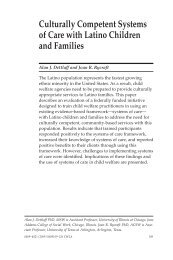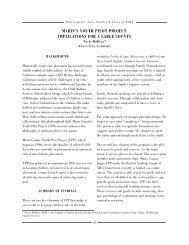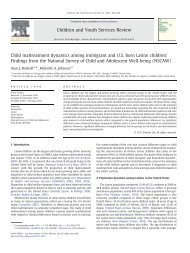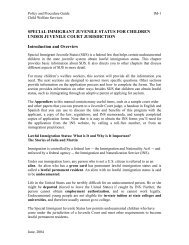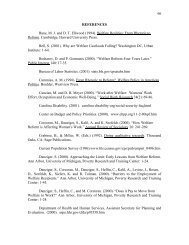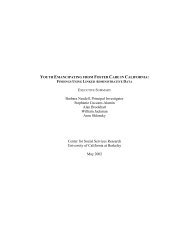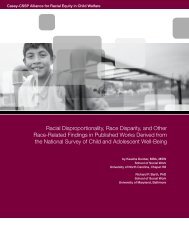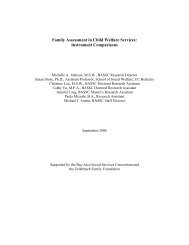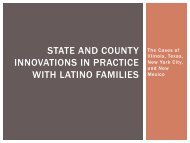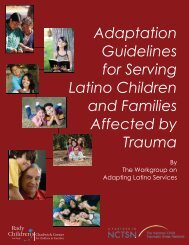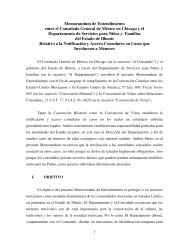CHAPTER 1: INTRODUCTIONThis report presents the results <strong>of</strong> the project <strong>Developing</strong> a <strong>Self</strong>-<strong>Assessment</strong> Tool for<strong>Culturally</strong> and Linguistically Appropriate Services in Local Public Health Agencies,sponsored by the U.S. Department <strong>of</strong> Health and Human Services’ (DHHS) <strong>Office</strong> <strong>of</strong><strong>Minority</strong> Health (OMH). The project’s objective was to construct an organizational selfassessmenttool for Local Public Health Agencies (LPHAs) that <strong>of</strong>fers sound measures <strong>of</strong>culturally and linguistically appropriate services (CLAS). In this project, the term LPHA isdefined as a publicly funded entity (i.e., local health department, local board <strong>of</strong> health, andother local government organization) responsible for providing essential public healthservices within a specific jurisdiction. 1 In addition, CLAS are defined as health careservices that are respectful <strong>of</strong>, and responsive to, the specific needs and preferences <strong>of</strong>racially, ethnically, culturally, and linguistically diverse populations (OMH 2001). Theself-assessment tool and corresponding data collection protocols generated by the projectwere developed around a conceptual framework <strong>of</strong> CLAS conceived in a recent OMHsponsoredstudy which produced a similar tool for collecting data from private-sectorhealth care entities—the National Study <strong>of</strong> <strong>Culturally</strong> and Linguistically AppropriateServices in Managed Care Organizations (OMH 2003b). 2The U.S. public health care system continues to be challenged by rapid and significantchanges in the structure <strong>of</strong> health care delivery as well as by the increasing cultural andlinguistic diversity <strong>of</strong> the populations served (Anderson et al. 2003). Various organizationsand political and economic realities are transforming public health’s traditional corefunctions. For instance, market-driven health care is forcing public health to clarify andstrengthen its public role in a now predominantly private system (Institute <strong>of</strong> MedicineIOM 1996). Projections from the 2000 Census indicate that racial and ethnic minoritieswill comprise nearly 50 percent <strong>of</strong> the U.S. population by 2050 (U.S. Bureau <strong>of</strong> the Census2001). Also, residents <strong>of</strong> the U.S. speak an estimated 329 languages, and 32 million speaka language other than English at home (Smith and Gonzalez 2000). Given this trend, theprovision <strong>of</strong> CLAS by LPHAs will continue to be <strong>of</strong> increasing importance because <strong>of</strong> thehigh proportion <strong>of</strong> racial and ethnic minorities served by LPHAs, the wide range <strong>of</strong>services they provide, and the critical role they play as safety net providers to the country’scommunities.1 The term LPHA was defined by the project’s expert panel to help differentiate it from a local healthdepartment (LHD), which does not fully capture all local, publicly funded organizations responsible forproviding essential public health services.2 While the original intent <strong>of</strong> the LPHAs project was to mirror the CLAS in MCOs study by developingand administering the tool to a representative sample <strong>of</strong> LPHAs, the project objectives and timeline weremodified due to shifts in departmental priorities.COSMOS Corporation, December 2003 1-1
While many LPHAs currently provide CLAS to their clients in some form, studiesindicate that CLAS are delivered in ad hoc fashion, vary significantly in their quantity andquality (Association <strong>of</strong> State and Territorial Health Officials ASTHO 1992; Mertz andFinocchio 1999), and reflect differing views <strong>of</strong> what constitutes “culturally andlinguistically appropriate health care services” (U.S. Conference <strong>of</strong> Local Health <strong>Office</strong>rs1993). Studies have shown that racial and ethnic minorities and persons with limitedEnglish pr<strong>of</strong>iciency (LEP) many times do not receive adequate services, and have to relyon family members, friends, or strangers who are not trained in the use <strong>of</strong> medicalterminology to guide them through a medical encounter (Milne 2000; National Association<strong>of</strong> County and City Health Officials NACCHO 1992). This is important because it isreported that 25 to 50 percent <strong>of</strong> words and phrases are incorrectly relayed in ad hocinterpretations, which significantly impacts the effectiveness and quality <strong>of</strong> health careservices (Interpreter Standards Advisory Committee 1998). Therefore, it was the project’sgoal to aid LPHAs by operationally defining CLAS in a systematic manner and provide anappropriate tool to help them collect important information about the extent <strong>of</strong> their CLASprovision.The remainder <strong>of</strong> this chapter presents current research that identifies evidence <strong>of</strong>persistent health disparities for racial and ethnic minorities, describes the important rolethat LPHAs play within the U.S. public health system, and describes the background underwhich the project was conceived. Chapter 2 presents the project’s methodology, whichincludes a review <strong>of</strong> the literature and relevant tools (that guided the revisions to theinstruments); the conceptual framework adopted from the CLAS in MCOs study; and theprocess employed to develop and revise the self-assessment tool. Chapter 3 reviews theresulting instruments which comprise the self-assessment tool, as well as recommendationson how to effectively use the tool.1.1 EVIDENCE OF PERSISTENT DISPARITIES IN HEALTH STATUS ANDHEALTH CARE QUALITYDespite steady improvements in the overall health <strong>of</strong> the nation, studies conducted inthe last decade confirm that racial and ethnic minorities continue to experience many healthdisparities (DHHS 1991; HRSA 2000). For instance, between 1997 and 1999, the infantmortality rate was highest for infants <strong>of</strong> non-Hispanic African American mothers (Pastor etal. 2002), and the infant mortality rate for African Americans was more than twice that <strong>of</strong>whites (Cohen and Goode 1999). Moreover, in 1999, age-adjusted death rates for theAfrican American population exceeded those for the white population by 38 percent forstroke, 28 percent for heart disease, 27 percent for cancer, and more than 700 percent forHIV disease (Pastor et al. 2002).In addition, rates for all types <strong>of</strong> cancer are higher for African Americans than forwhites (DHHS 1991), and although African American and white women are screened forCOSMOS Corporation, December 2003 1-2
- Page 1 and 2: Developing a Self-Assessment Toolfo
- Page 3 and 4: ContentsChaptersPage1. Introduction
- Page 5: Chapter 1Introduction
- Page 9 and 10: LPHAs include: adult and child immu
- Page 11 and 12: Professions Education Partnership A
- Page 13 and 14: Chapter 2Methodology for Developing
- Page 15 and 16: Public Health Practice Program Offi
- Page 17 and 18: assess their own beliefs and have k
- Page 19 and 20: communicate with, and clearly under
- Page 21 and 22: 2.1.6 Identifying Key Components of
- Page 23 and 24: Given these persistent disparities
- Page 25 and 26: (Exhibit 2-2, Continued)DOMAIN / KE
- Page 27 and 28: limited to the actual clinical enco
- Page 29 and 30: Chapter 3Project Results and Recomm
- Page 31 and 32: local board of health. PEP and PAG
- Page 33 and 34: numerous promising CLAS practices a
- Page 35 and 36: References
- Page 37 and 38: Becker, M.H., and L.A. Maiman, “S
- Page 39 and 40: Frye, B., “Health Care Decision M
- Page 41 and 42: Marin, G., “Defining Culturally A
- Page 43 and 44: Perkins, Jane, “Overcoming Langua
- Page 45 and 46: U.S. Bureau of the Census, “Censu
- Page 47 and 48: Appendix AMembership Lists of the P
- Page 49 and 50: Appendix A-1Developing a Self-Asses
- Page 51 and 52: Appendix A-2Developing a Self-Asses
- Page 53 and 54: Appendix B-1Overview of Eight CLAS
- Page 55 and 56: Domain 3: Culturally Inclusive Heal
- Page 57 and 58:
understanding of diversity issues i
- Page 59 and 60:
Appendix B-2Conceptual Framework fo
- Page 61 and 62:
Appendix CLPHA Director or Designee
- Page 63 and 64:
Pre-Interview Script for LPHA Direc
- Page 65 and 66:
3b. Which of the following are refl
- Page 67 and 68:
6. Does your agency have a formal p
- Page 69 and 70:
10. Which of the following describe
- Page 71 and 72:
Post-Interview Script for LPHA Dire
- Page 73 and 74:
Appendix DStaffing Questionnaire
- Page 75 and 76:
A. QUALITY MONITORING AND IMPROVEME
- Page 77 and 78:
B. MANAGEMENT INFORMATION SYSTEMS (
- Page 79 and 80:
7. Please indicate, if you know, th
- Page 81 and 82:
1c. Please indicate for which categ
- Page 83 and 84:
6. Please indicate for which catego
- Page 85 and 86:
10. Which of the following topical
- Page 87 and 88:
17. Which of the following benefits
- Page 89 and 90:
4. Which of the following strategie
- Page 91 and 92:
Appendix EClient Services Questionn
- Page 93 and 94:
A. QUALITY MONITORING AND IMPROVEME
- Page 95 and 96:
6b.Which of the following community
- Page 97 and 98:
3. Please report or estimate what p
- Page 99 and 100:
3. Which of the following practices
- Page 101 and 102:
Oral Interpretation Services10. Whi
- Page 103 and 104:
16. At which of the following key e
- Page 105 and 106:
3. Which of the following kinds of
- Page 107 and 108:
Appendix FPilot Test Response Form
- Page 109 and 110:
RESPONDENT EVALUATIONOF THE QUESTIO
- Page 111 and 112:
Appendix GCLAS in MCOs Study Data C
- Page 113 and 114:
position, as titles will likely var
- Page 115 and 116:
complex and uncertain at the time t
- Page 117 and 118:
1. Incorporate a confirmation pre-c
- Page 119 and 120:
Exhibit 2DATA COLLECTION PROCESSSen



